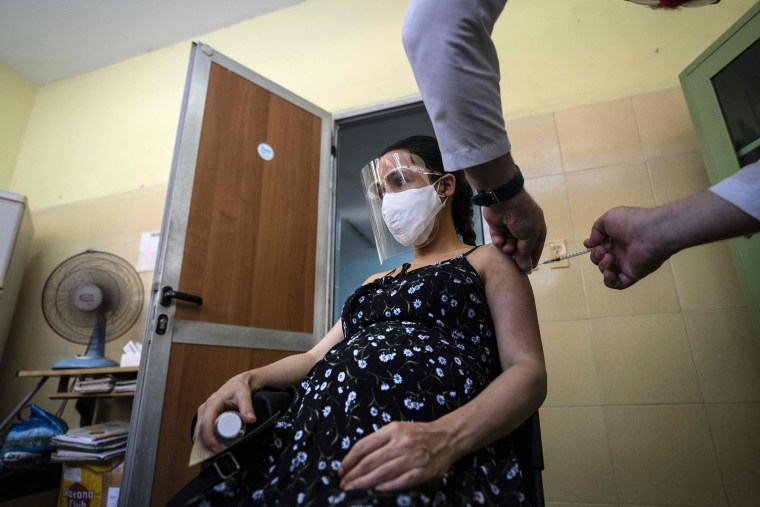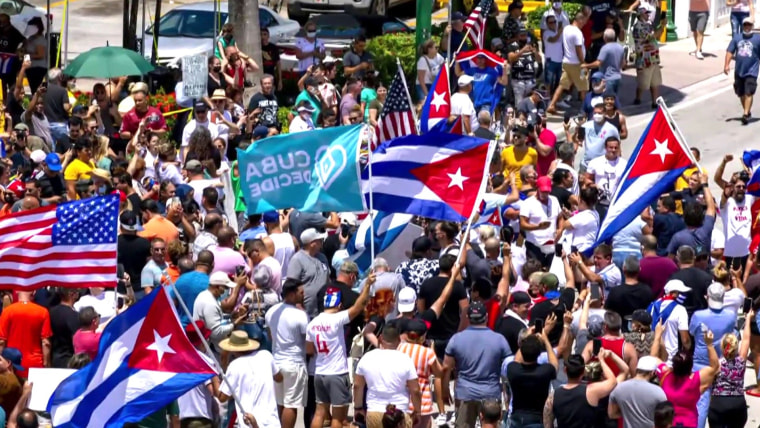.

HAVANA — Niurka Rodríguez is besieged by Covid-19. Across the road, a famous pitcher who played baseball for her province, Ciego de Ávila, recently died after contracting the virus. Many of her neighbors are infected, and her local clinic has no rapid tests.
“We’re living through a war,” said Rodríguez, 57, a homemaker.
Over the last month, daily case numbers in the communist-ruled island have tripled as the delta variant of the coronavirus has taken root. While total daily case numbers remain under 10,000, the country now has the highest contagion rate per capita in Latin America, although the mortality rate remains well below the regional and world averages.
The central province of Ciego de Ávila, where Rodriguez lives, is the current hot spot. With the local health care system overwhelmed, the government last week converted two of 30 hotels in the province into hospitals. Two hundred Cuban doctors were also withdrawn from posts in Venezuela to treat the surge in cases.
“These are good decisions, but they could have been taken earlier,” Rodríguez said. “The local [Communist] Party has been badly organized.”
Government leaders agree. “We needn’t be embarrassed that [the virus] has exceeded the capacities of our institutions — this has happened around the world,” Prime Minister Manuel Marrero said last week. “But we ought to be embarrassed when ... effects are increased by our shoddy work, our negligence and our errors.”
Thousands take to the streets in Cuba demanding food, medicine, freedom
JULY 12, 202102:02Despite the caption, this photo appears to be from Miami.
Such pointed self-criticism from the government is rare. The change in language reflects a deteriorating situation on the ground, as well as, perhaps, an attempt to chime with popular discontent following unprecedented anti-government protests last month.
Throughout last year the island, which touts its status as the country with the highest doctor-to-patient ratio, implemented a successful track, trace and isolation regimen. All positive patients were hospitalized, including asymptomatic patients. Cuba's government reported that just 146 people died from the virus last year, the equivalent of 13 deaths per million throughout the year (the U.S. recorded 1,024 deaths per million over the same period).
But last week alone, the death toll was 602.
The country is getting humanitarian assistance. Last week, ships bearing oxygen from Mexico, syringes from Bolivia and rice from Vietnam docked on the island’s shores. Canada donated over a million tablets of dexamethasone, an anti-inflammatory and immunosuppressant drug.
Meanwhile, groups in the U.S. including the Saving Lives Campaign and CODEPINK teamed up under Global Health Partners and raised over $500,000 for syringes for the island. Two million syringes from the U.S. arrived last month.
'Health workers can't be defeatist'
In the midst of it all, the country’s overworked, underpaid doctors trundle on.
“Health workers can’t be defeatist,” said Dr. Santos Huete, who earns the equivalent of $105 a month working in a hospital in Havana. He has not had a day off since the pandemic began.
“We’ve had so much work we haven’t been able to fall into depression,” he joked.
Dr. Maritza Damera, 50, a physician, came down with a relatively light case of Covid last week. With the country aligning its protocols with the international norm of hospitalizing only serious cases because of high case numbers, she is quarantining at home.
“Health workers are giving their all, but they do not have enough personal protective equipment,” she said.
In the stress and uncertainty, Damera has been brought to tears by the compassion of those around her.
“Friends have brought me antibiotics, steroids, chicken and gelatine,” she said. “Despite the circumstances, Cubans have not lost their humanity.”
Opting to develop its own vaccines rather than import, Cuba got out of the starting blocks later than many other countries in the region. Cuban regulators approved the homegrown Abdala vaccine for emergency use last month, making Cuba the first Latin American country to develop a successful Covid vaccine. Phase 3 clinical trials of Abdala and Soberana 2, the other Cuban vaccine, reported over 90 percent efficacy rates. But international health organizations have urged Cuba to publish trial data in peer-reviewed scientific journals so the efficacy can be evaluated by global scientists.
Twenty-five percent of Cubans have been fully vaccinated, while 42 percent have received at least one dose. Both figures are above the Latin American average (22 percent fully vaccinated, 24 percent partly vaccinated).
But statistics matter little to those still waiting as the death toll rises.
Sanctions blamed for slower vaccine rollout
In this race against time, Cuban scientists say U.S. sanctions on the island have slowed the rollout of the vaccines.
Of the two Cuban vaccines, state media initially heavily promoted Soberana 2. Yet far more Cubans have been vaccinated with the other vaccine, Abdala.
Vicente Vérez, Soberana 2’s lead developer, said the manufacturer had to slow vaccine production, because it didn't have all the necessary components.
“Businesses which have traded with Cuba for decades suddenly told us they can no longer continue," Vérez said, declining to give details, citing security concerns. “If I specified, I’d be giving them [the U.S. government] exactly the information they need to put their finger in the wound.”
Earlier in the pandemic, two Swiss companies that had previously sold Cuba ventilators said they could no longer continue trading with the island after they were bought out by Vyaire Medical, an Illinois company.
“The U.S. pays lip service to the idea that medicines can be sent to Cuba,” said Dr. Mitchell Valdés-Sosa, a member of Cuba’s Coronavirus Task Force. “But there’s an explicit prohibition of anything being exported to Cuba that can be used for biotech. That includes vaccines.”
Valdés-Sosa cited the 1992 Cuban Democracy Act, still in force, which states: “Exports of medicines or medical supplies, instruments, or equipment to Cuba shall not be restricted ... except in a case in which the item to be exported could be used in the production of any biotechnological product.”
The 62-year embargo was supercharged under the Trump administration's over 200 sanctions. Even though President Joe Biden campaigned to ease them, the administration has so far left the Trump-era sanctions in place.
The administration earmarked the island as a low priority in its early months, but in light of the protests, it recently sanctioned several officials over human rights abuses and is expected to announce new measures.
The Cuban Neuroscience Center, which Valdés-Sosa directs, has manufactured 164 Cuban-designed ventilators since the pandemic began. It suffers intermittent power outages.
“Our biotech industry is working under conditions of limitations,” he said. “We make a great effort not to go over the electricity quota, because we know it will affect the population.”
Ramping up shots
Vérez, the vaccine developer, said that sourcing problems for the Soberana 2 vaccine have been resolved and that over the last few weeks production has been ramped up to industrial scale.
Vaccination is now going at a faster clip: Around 1 percent of the population is being vaccinated daily, and the Public Health Ministry says it is on track to have 70 percent of adults vaccinated by the end of the month.
While the recent news that the majority of new Covid cases in Havana are among those who are vaccinated has caused concern, scientists emphasize that the capital’s vaccination campaign finished only last week and that time is required for the vaccines to take full effect.
The Public Health Ministry published promising data indicating that from June to July, the death rate of those who contracted the virus more than halved in the parts of Havana where the vaccination campaign began.
The hope is that the picture will extend to the provinces in the coming weeks and that there will be a reduction in the death count, followed by lower caseloads.
For Huete, the upbeat doctor, hope is the only option. “We have to think we’re going to triumph and see the light.”
https://www.nbcnews.com/news/latino/living-war-cuba-race-vaccinate-covid-surges-rcna1635

No comments:
Post a Comment